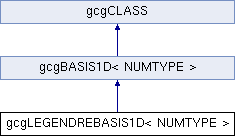|
| bool | setBasisDegree (unsigned int degree) |
| | Sets the maximum degree of the polynomials of the basis. The number of polynomials = maximum degree + 1. More...
|
| |
| bool | setNumberOfSamples (unsigned int nsamples) |
| | Sets the number of samples for the discretization of polynomial functions. Call it BEFORE using getDiscreteValue(), projectSignal(), reconstructSignal() or basisInformation(). This method computes all polynomial basis vectors which might be slow if current degree is big. More...
|
| |
| unsigned int | getNumberOfCoefficients () |
| | Returns the number of coefficients used in 1D polynomial projection/reconstruction. More...
|
| |
| NUMTYPE | getPointValue (unsigned int idegree, NUMTYPE x) |
| | Computes the value of the polynomial of idegree degree at point x in [-1, 1]. More...
|
| |
| NUMTYPE | getIntegralValue (unsigned int idegree, NUMTYPE a, NUMTYPE b) |
| | Computes the integral of the polynomial of degree idegree in the interval [a, b]. More...
|
| |
| NUMTYPE | getDiscreteValue (unsigned int idegree, unsigned int i) |
| | Compute normalized i-th sample of the polynomial of degree idegree. Parameter i in [0, nsamples-1] is the i-th sample of a uniform discretization of the domain [-1,1] with nsamples samples. Call setNumberOfSamples() to set the number of samples to be used. More...
|
| |
| bool | projectSignal (int atX, gcgDISCRETE1D< float > *vector, gcgDISCRETE1D< NUMTYPE > *outputcoef) |
| | Computes the npolynomials coefficients of the projection of the vector (as 1D signal) on the discretized basis of current degree + 1 polynomials = npolynomials. Only nsamples elements starting at atX are used. The coefficients are stored in array outputcoef (as 1D signal) that is adjusted to have current degree + 1 elements. Call setNumberOfSamples() to set the number of samples to be used. More...
|
| |
| bool | reconstructSignal (int atX, gcgDISCRETE1D< NUMTYPE > *inputcoef, gcgDISCRETE1D< float > *outputvector) |
| | Computes up to nsamples components of a vector (as 1D signal), using the degree + 1 coefficients given in array inputcoef (as 1D signal). The components are stored in the array outputvector (as 1D signal) starting at position atX. Call setNumberOfSamples() to set the number of samples to be used. More...
|
| |
| bool | basisInformation (const char *filename) |
| | Output basis information with current degree for numerical analysis. Saves information of the orthogonality of the basis with nsamples elements. Call setNumberOfSamples() to set the number of samples to be used. More...
|
| |
| void * | operator new (size_t size) |
| | Defines a new operator to be used by instatiations of GCGlib classes instead the global one. More...
|
| |
| void * | operator new (size_t size, const std::nothrow_t &) throw () |
| | Defines a new operator to be used by instantiations of GCGlib classes instead the global one. Returns a NULL pointer instead of throwing an exception if an error occurs. More...
|
| |
| void * | operator new[] (size_t size) |
| | Defines a new operator to be used by GCGlib array allocations instead the global one. More...
|
| |
| void * | operator new[] (size_t size, const std::nothrow_t &) throw () |
| | Defines a new operator to be used by vector allocations instead the global one. More...
|
| |
| void | operator delete (void *p) |
| | Defines a delete operator to free instances of GCGlib classes instead the global one. It is designed to match the new operator. More...
|
| |
| void | operator delete (void *p, const std::nothrow_t &) throw () |
| | Defines a delete operator to free instances of GCGlib classes instead the global one. It is designed to match the new operator. More...
|
| |
| void | operator delete[] (void *p) |
| | Defines a delete operator to free instances of arrays for GCGlib classes instead the global one. It is designed to match the new[] operator. More...
|
| |
| void | operator delete[] (void *p, const std::nothrow_t &) throw () |
| | Defines a delete operator to free instances of arrays for GCGlib classes instead the global one. It is designed to match the new[] operator. More...
|
| |
template<>
class gcgLEGENDREBASIS1D< NUMTYPE >
Class for Legendre 1D polynomials computation.
- Template Parameters
-
| NUMTYPE | Type of the samples representing the signal. Supported types: float or double. |
Use gcgLEGENDREBASIS1D<float> for single precision and gcgLEGENDREBASIS1D<double> for double precision. Methods for projection and reconstruction are avalaible. The performance of the numeric methods can be verified by using the basisInformation() method.
- Since
- 0.01.6



 Public Member Functions inherited from gcgCLASS
Public Member Functions inherited from gcgCLASS